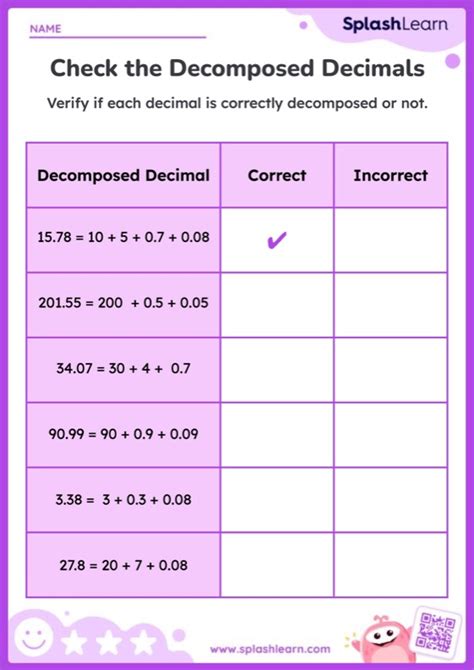Decimals are a fundamental part of mathematics, and understanding how to decompose them is essential for building a strong foundation in math. Decomposing decimals, also known as expanded form, is a way of expressing a decimal number as a sum of its place values. In this article, we'll delve into the world of decimals, explore the concept of expanded form, and provide practical examples and tips to make it easy to understand and apply.
Why is Decomposing Decimals Important?

Decomposing decimals is a crucial skill in mathematics, as it helps students understand the concept of place value and how numbers are constructed. By breaking down a decimal into its individual place values, students can gain a deeper understanding of the number system and develop a strong foundation for more advanced math concepts. Additionally, decomposing decimals is a useful skill in real-world applications, such as finance, science, and engineering, where precise calculations are essential.
Understanding Place Value
To decompose decimals, it's essential to understand the concept of place value. Place value refers to the value of a digit depending on its position in a number. In the decimal system, each digit has a place value that is a power of 10. For example, in the number 456.78, the 4 is in the hundreds place, the 5 is in the tens place, the 6 is in the ones place, the 7 is in the tenths place, and the 8 is in the hundredths place.
How to Decompose Decimals

Decomposing decimals is a straightforward process that involves breaking down a decimal number into its individual place values. Here's a step-by-step guide:
- Write the decimal number.
- Identify the place value of each digit.
- Break down the decimal number into its individual place values.
- Express each place value as a fraction or a decimal.
For example, let's decompose the decimal number 4.567:
- Write the decimal number: 4.567
- Identify the place value of each digit: 4 (ones place), 5 (tenths place), 6 (hundredths place), 7 (thousandths place)
- Break down the decimal number into its individual place values: 4 + 0.5 + 0.06 + 0.007
- Express each place value as a fraction or a decimal: 4 + 5/10 + 6/100 + 7/1000
Practical Examples
Here are some more practical examples to illustrate the concept of decomposing decimals:
- Decompose 2.34:
- 2 (ones place)
- 0.3 (tenths place)
- 0.04 (hundredths place)
- 2 + 3/10 + 4/100
- Decompose 9.876:
- 9 (ones place)
- 0.8 (tenths place)
- 0.07 (hundredths place)
- 0.006 (thousandths place)
- 9 + 8/10 + 7/100 + 6/1000
Benefits of Decomposing Decimals

Decomposing decimals has several benefits, including:
- Improved understanding of place value
- Enhanced ability to perform mathematical operations with decimals
- Increased precision in calculations
- Better comprehension of mathematical concepts, such as fractions and percentages
Real-World Applications
Decomposing decimals has numerous real-world applications, including:
- Finance: Calculating interest rates, investment returns, and currency exchange rates
- Science: Measuring physical quantities, such as length, mass, and time
- Engineering: Designing and optimizing systems, such as bridges and electronic circuits
Tips and Tricks

Here are some tips and tricks to help you master decomposing decimals:
- Practice, practice, practice: The more you practice decomposing decimals, the more comfortable you'll become with the concept.
- Use visual aids: Visual aids, such as diagrams and charts, can help you understand the concept of place value and decomposing decimals.
- Break down complex numbers: When faced with a complex decimal number, break it down into its individual place values to make it more manageable.
Conclusion
Decomposing decimals is a fundamental skill in mathematics that has numerous benefits and real-world applications. By understanding the concept of place value and breaking down decimal numbers into their individual place values, you can improve your mathematical skills and develop a strong foundation for more advanced math concepts. Remember to practice regularly, use visual aids, and break down complex numbers to make decomposing decimals easy and fun.
What is decomposing decimals?
+Decomposing decimals is a way of expressing a decimal number as a sum of its place values.
Why is decomposing decimals important?
+Decomposing decimals is important because it helps students understand the concept of place value and develops a strong foundation for more advanced math concepts.
How do I decompose a decimal number?
+To decompose a decimal number, write the decimal number, identify the place value of each digit, break down the decimal number into its individual place values, and express each place value as a fraction or a decimal.
